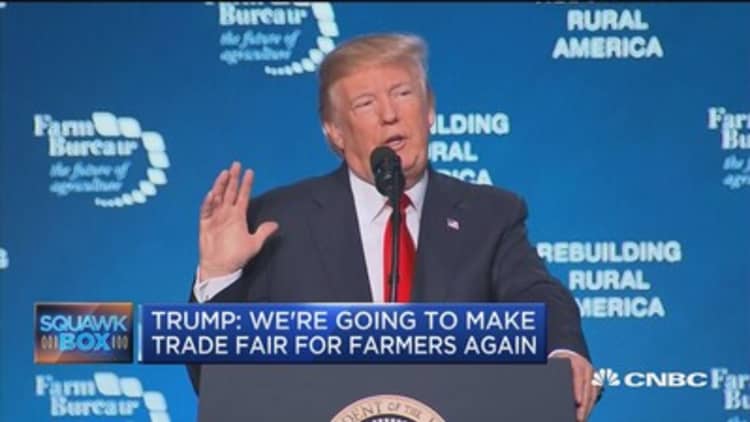California's agriculture industry already faces a farm labor shortage, but now it's facing added pressure due to a wave of employee audits ordered for large farms throughout the state's Central Valley.
Up to 10 agribusiness employers in the state's San Joaquin Valley were recently contacted by the U.S. Immigration and Customs Enforcement about notices of inspection, said Manuel Cunha, president of the Nisei Farmers League, a Fresno-based agriculture advocacy group.
"These ICE audits have had nothing but a chilling, damaging effect," Cunha said Thursday.
Some have suggested that California businesses are being unfairly targeted in the Trump administration's immigration enforcement efforts due to the state's controversial "sanctuary law," which bars local authorities from asking about the immigration status of people during routine interactions.
However, President Donald Trump said Thursday he's considering pulling federal immigration enforcement agents from California. He made those comments after lashing out at California's "sanctuary" state status and "protection of these horrible criminals."

"We're getting no help from the state of California," Trump said. "Frankly, if I wanted to pull our people from California, you would have a crime mess like you've never seen. All I'd have to do is say, 'ICE and Border Patrol, let California alone.' You'd be inundated, you would see crime like nobody's ever seen crime in this country."
The latest ICE audits on agribusinesses involved packing and processing houses as well as some farms being asked to show their hiring records.
"There were a couple of agricultural facilities that did have the audits that were taking place in the last couple of weeks," said Ryan Jacobsen, CEO of the Fresno County Farm Bureau. "It's been a couple of years since we saw it to the extent that we did."
Jacobsen said last year was "an extraordinarily tight year" in terms of farm labor supply in the Central Valley and arguably the tightest the region has seen in a decade. "The assumption is that this will continue into this year, but we're on the early cusp on when a lot of the [agricultural] activity really gets going in the valley."
The federal immigration audits in the state's top agricultural region follow last week's announcement that ICE agents conducted a week-long crackdown in Southern California, arresting 212 undocumented immigrants and serving notices of inspection to 122 businesses. Also, in January dozens of other businesses in Northern California were audited.
ICE declined to comment for this story.
Federal officials have previously said the focus of the employee audits nationwide is on a wide variety of industries, because "all businesses regardless of industry or size, are expected to comply with the law."
Meantime, the state also passed an Immigrant Worker Protection Act that went into effect in January that bars employers from voluntarily giving employee information to federal authorities. It also requires employers to notify all employees of inspections of their employment records by U.S. immigration agencies within 72 hours of receiving notice of the federal audit.
California's attorney general, Xavier Becerra, warned in January that businesses could face a fine of $10,000 if they violated the new law. According to Cunha, the state attorney general's threat to go after companies has made the situation tougher for employers and the requirement of posting the letter of a pending audit has scared farm workers.
WATCH: Trump tell farmers he wants a better deal on NAFTA



